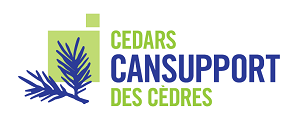Founder’s story
 Back in 1984, cancer survivor Gwen Andrews Nacos had no idea that a 10-minute meeting with a cancer patient would change her life and affect the lives of countless others.
Back in 1984, cancer survivor Gwen Andrews Nacos had no idea that a 10-minute meeting with a cancer patient would change her life and affect the lives of countless others.
Gwen, who had undergone surgery just three weeks earlier to remove a cancerous tumour from her bladder, was asked by a nurse to meet with a woman who was about to undergo the same procedure. While Gwen, who was 38 at the time, didn’t think much of the impromptu meeting in which she showed her wounds and shared some stories, the nurse later thanked her profusely for what she had done. While Gwen insisted she hadn’t done anything, the nurse replied, “You cared enough to be there and you shared something that was very critical to her.”
It was at that moment that Nacos learned the power of simply being there for someone, and so was born the initial concept for Cedars CanSupport.
Filling the void of patient support
At the time of her own cancer treatment, which involved years of intensive and intrusive radiation and chemotherapy, Gwen said she wasn’t aware of any support services that existed to assist patients. While she was fortunate to have support from family and friends, Gwen saw first hand that many others weren’t as lucky.
“While sitting in waiting rooms and lying in hospital beds, I became aware that many cancer patients lacked the resources and support that I was privileged to have,” she said, noting that Cedars CanSupport’s services can be crucial for someone newly diagnosed with cancer. “People are very vulnerable when they’ve been diagnosed with cancer. The first question they ask is, ‘Am I going to die?’” she said. “When you’re vulnerable you don’t know what questions to ask. You don’t know what to look for because you don’t know what’s out there. You don’t know anything at that point.”
Soon after they are diagnosed, cancer patients are informed about the myriad of Cedars CanSupport services available to them – all offered free of charge and in both English and French. “We let them know there will be someone there for them at any time, at every step of the way,” Nacos says.
The organization’s beginnings were modest, starting with Gwen and a desk in the volunteer office at the Royal Victoria Hospital. The very first services offered were brochures and pamphlets that included information such as a list of local wig stores. But it wasn’t long before Cedars CanSupport began pairing patients up with volunteers, helping them deal with the emotional, psychological and spiritual issues that can arise after a cancer diagnosis.
Cancer treatment is so much more than just the surgery, radiation, chemotherapy and hormone therapy.
“It’s all of the emotional and practical issues – how do I get to the hospital? How can I afford parking if I need radiation everyday, five days a week for five or six weeks? How can I get there? Who will take care of my children at home?” Gwen says. “When you don’t know there are services available to you, there’s an amount of anxiety and distress.”
Today, Cedars CanSupport remains a vital and key element of the compassionate cancer centre at the McGill University Health Centre. It continues to provide cancer patients and their families with practical, educational, emotional and humanitarian support. This is done by a staff of professionals and trained volunteers, many of whom are cancer survivors themselves.
“People asked me then, as they still do now, ‘What led you to start Cedars CanSupport, and why do you stay so involved today, so many years later?’” Gwen says. “I reply that, since I was so fortunate to win my own personal fight with cancer, perhaps I can help others who are also facing this dreadful disease. Until Cedars CanSupport services are offered to every new patient of the MUHC, thus creating a true model of supportive cancer care, my work is not finished,” she added.

